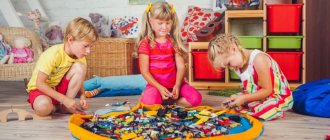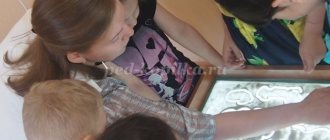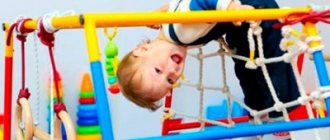Long-term plan for the work of the parents' club in the preschool educational institution
Long-term plan for working with parents “Commonwealth”
In our group, we decided to create a parent club “Commonwealth” (a community of parents, children and educators), where parents could not only receive oral advice to supplement their teaching experience, participate in master classes, share their experience, gain knowledge and skills about preparing for traditional holidays.
And be sure to communicate with others and of course with your children. So that they create something in a difficult way, namely communicate with children during creativity, that is, pass on their skills to children, and where children could teach their parents what they learned in group classes, so that the authority of their parents grows in their eyes children. So that the children can say that this craft, this flower was made by my mother, and I helped her, so that spiritual unity between the child and the parents could be achieved. It is no secret that most parents reduce their communication with children to edification and dictation, watching TV and everyday care of their children, and few people pay attention to the culture of communication, the joint participation of adults and children in some business or event. But it is the family that is the primary source of socialization, the upbringing of the cultural and moral qualities of the child, although it even happens that parents, although they have pedagogical knowledge, do not know how to use it. All this prompted us to create a parent club. After conducting a survey of parents, we found out that most parents would like to learn how to do something with their own hands, learn more about the holidays, and the traditions of preparing for the holidays. Goals and objectives of the parent club: 1. Combining the efforts of teachers and parents to unite the parent team, actualize personal responsibility, and unlock the resources of parents.
2. Ensuring personal communication with children, involving parents in the life of the group. 3. Expanding the teaching experience of parents. 4. Determination and improvement of the cultural level of parents. Long-term work plan for the parent club
September. The topic of the lesson is
“Let’s get to know each other.”
The purpose of the lesson
is to find out what hobbies parents have, what they want to know, what to learn.
Discuss the topic of the lesson. Contents
: survey and questioning of parents, preparation of lesson topics.
October
.
The theme of the event is
“Autumn Rainbow, Leave the Window Open.”
Goal:
To bring to the understanding of parents that communication between the child and parents takes place every day, through them the child learns the world and gains communication experience.
Introduce parents to techniques for making appliques from herbs, flowers, and leaves. Contents
: Learning to communicate with children.
Social relations between child and parents. Together we make an applique of herbs, flowers, leaves. We properly dry the material for the application. November
.
Topic:
“The eyes are afraid - the hands are doing.”
Goal:
to introduce parents to various types of arts and crafts, to teach how to make crafts from vegetables and fruits.
Contents:
Explain to parents how, with the help of vegetables and fruits, you can make interesting crafts and still lifes together with children and, while playing, reinforce the names of colors, teach them to compare objects by shape, size and color.
Develop tactile and taste skills. December. Topic:
“New Year is coming.”
Goal:
invite parents to share their experience of preparing for the New Year.
Show how to make Christmas tree toys, garlands, and holiday gifts from waste materials. Contents:
the house in which the baby lives.
Traditions of your home, how to prepare for the New Year, making crafts for the holiday. January
.
Topic:
“Christmas, folk holidays, traditions.”
Goal:
to introduce parents to how Christmas was celebrated in Russia, how the tradition of giving Christmas cards began.
Learn how to make Christmas cards. Contents
: Christmas, how Christmas was celebrated in the old days, preparation for carols.
Making Christmas cards. February. Topic:
“Let’s set up an art gallery.”
Goal:
to conduct a consultation for parents “In the world of beauty.”
Encourage parents to pay more attention to their children in matters of artistic and aesthetic development of children. Contents:
teach parents how to make a picture frame together with their children with their own hands.
Drawing develops a child’s hand, motor skills, and imagination; by drawing we communicate with the child. We make frames for our children's drawings. March. Topic:
“Flowers in our home.”
Goal:
Conducting a master class “These delicate flowers”.
Flowers made of paper, fabric, satin ribbons. Contents
: the need and usefulness of flowers in the house.
We make flowers from paper, fabric, satin ribbons. April. Theme
: Easter, Easter decorations, traditions.
Goal:
tell parents how they celebrated Easter in the old days, how they prepared, what Easter decorations they made.
Show and teach how to decorate Easter eggs and decorate eggs with decoupage. Contents
: Easter, Easter traditions, Easter decorations, drawing Easter eggs, making decoupage.
May. Topic:
"Mind at your fingertips."
Purpose:
To explain to parents how by training children’s fingers, we develop their minds.
Show how to use quilling to develop fine motor skills of the fingers and visual coordination in the “eye-hand” system in children. Introduce parents to the technique of making paper crafts using the quilling method. Contents:
train your fingers, develop your mind, and visual coordination. We make paper crafts.
We recommend watching:
Information and educational newspaper for parents in kindergarten Consultation for teachers on the topic “Working with parents in preschool educational institutions” Plan of work with parents of the preparatory group for the year Round table for parents in kindergarten. Preparatory group
Similar articles:
Dividing parents in kindergarten into groups
Parents' club in preschool educational institutions as an effective way of interaction
Natalia Zrelova
Parents' club in preschool educational institutions as an effective way of interaction
Parents' club in preschool educational institutions as an effective way of interaction
Author of the article: Teacher-psychologist - Zrelova N.V.
(MBDOU kindergarten No. 9, Murmansk region, Nikel town)
“Children are happiness created by our work. Classes and meetings with children, of course, require mental strength, time, and labor. But we are happy when our children are happy, when their eyes are filled with joy.”
V. A. Sukhomlinsky
The role of the family in society is incomparable with any other social institutions, because it is in the family that the child’s personality is formed and developed, and the social roles necessary for adaptation in society are mastered. The leading role of the family in raising children is defined in the Law of the Russian Federation “On Education”
, it is
parents who are the first teachers, and they are obliged to lay the foundations for the comprehensive development of the child. But, as practice shows, modern parents need the help of teachers and specialists in raising children. But the harmonious development of a child requires unity and consistency of the entire system of educational influences of adults on the child. The kindergarten is trying to complement and enrich the shortcomings of the system of family education and home education. However, this is impossible without educating parents and developing the psychological and pedagogical competence of the family in the process of cooperation, as well as without the development of the child in the family.
The family and preschool educational institution are two important institutions for the socialization of children. “family-children-teachers” should be created in a preschool institution
, which is characterized by
mutual assistance , cooperation with each other, taking into account the capabilities and interests of everyone, their rights and responsibilities.
Our kindergarten has accumulated extensive experience in organizing cooperation with parents in order to increase the effectiveness of the formation of the mental, moral, physical, psychological education and development of children. Realizing the urgency of the problem of enhancing interaction and finding “common ground”
, optimizing the process of joint education and training of preschoolers, we present as an alternative option
for interaction such a form of work as a parent club . In our institution, the parent club has been successfully functioning for more than ten years and is called “The Connecting Thread”
.
The parent club in a preschool educational institution is an additional component of the educational process, where parents and teachers can gain knowledge and develop their skills in order to further join forces and provide the child with protection, emotional comfort, an interesting and meaningful life in kindergarten and at home.
The objectives of our parent club are :
— convince parents that their interaction with teachers is the most important condition for the comprehensive development of children;
— introduce parents to various issues of age-related pedagogy and child psychology;
— inform that families at all stages of development need the help of specialists.
Parents' Club "The Connecting Thread"
covers such areas
of interaction with parents as : interaction with parents of 2-3 year old pupils who entered kindergarten during the adaptation period, as well as conducting trainings and round tables for parents of children in pre-school groups. Naturally, attention is paid to other groups of children throughout the year. Meetings are held once a month; if possible or desired by parents, the number of meetings can be increased. Preschool educational institution No. 9 “Romashka”
defines the following stages for the implementation of the
parent club :
Stage 1 – Preparatory (questioning parents club meetings , organizational meeting of parents , preparation of stands, information sheets, etc.). Implementation period: September;
Stage 2 – Main stage (first meeting “Dating” club
,
“Why are all children different”
,
“Psychological characteristics of preschool age”
,
“Development of fine motor skills”
,
“Whims and stubbornness”
,
“Development of social and communication skills”
,
“On the threshold of school”
,
“Aggression”,
etc.). Timing implementation: November – April;
Stage 3 – Evaluation (collection of information about meetings, questioning of parents , analysis of questionnaires filled out by parents ). Implementation period: May.
Forms of communication in “ Parents Club ”
can be varied: visual, verbal, game, demonstration, contests, holidays, competitions, trainings, round table, etc. Meetings are held with the participation of not only educators and an educational psychologist, but also a physical education worker, medical worker, speech therapist, social worker teacher It is important to show families that the kindergarten is interested in the full and harmonious development of each child.
Often, parents are afraid to ask preschool specialists with any request or question, hoping that the problem will resolve itself. But nothing will change if you don't pay attention. Children need understanding, love and care. Therefore, it is also important to make parents that the teaching staff of the kindergarten will always help.
Summing up the work of the teaching staff and psychological service within the framework of “ Parents Club ”
It should be noted that the level of pedagogical competence and psychological awareness
of parents has increased significantly , as shown by the analysis of questionnaires and questionnaires. Parents began to better understand the needs of their children, strive for effective cooperation with the kindergarten, and learned to see teachers primarily as assistants in raising children.
Consequently, this form of work is quite effective and can be used for the purposes of pedagogical support and psychological education of the family, based on the social needs of parents .
Literature:
1. Zvereva O. L. Parent meetings in preschool educational institutions : method. allowance / O. L. Zvereva. T. V. Krotova. – M. Iris-press, 2006. – 128 p.
2. Pakhtusova I. O. Creation of a unified space for child development: interaction between preschool educational institutions and families . – M.: TC Sfera, 2007. – 48 p.
3. Working with parents : practical recommendations and consultations on raising children 2-7 years old / author. -composition E. V. Shitova. – Ed. 2nd. –Volgograd: Teacher, 2015. – 169 p.
4. Family and parent clubs in kindergarten . Methodical recommendations / Ed. N.V. Miklyaeva. – M.: Sfera, 2012. – 128 p.
5. Tavrebidze V. A., Kalugina V. A. Organization and content of work with parents . From the experience Svetlyachek parent club
.
– M.: School Press, 2008. – p. – (“Preschool education and training – supplement to the journal “Education of Schoolchildren”
; Issue 174).





